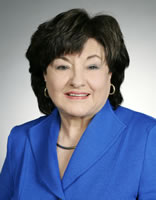In order to provide equal access and equal opportunity to people with diverse abilities, this site has been designed with accessibility in mind. Click here to view
Easley’s Funeral Picketing Bill Approved by Senate
 Senator Mary Easley
Senator Mary Easley
State Senator Mary Easley (D-Tulsa), vice-chair of the Senate Energy and Environment Committee said she was pleased that her funeral picketing bill was approved by the full Senate on Monday.
Senate Bill 1020, known as the “Oklahoma Funeral Picketing Act” would make it a misdemeanor to picket within 500 feet of a cemetery, mortuary or church from one hour before the scheduled commencement of funeral services until one hour after the actual completion of the funeral services.
The House co-author is Rep. Wade Rousselot (D- Waggoner).
“I have received so many phone calls from my constituents for something to be done,” Easley said. “I’m very pleased that my fellow Senators approved this bill. “Funerals are an emotional experience and grieving families shouldn’t have to deal with groups that want to use those somber occasions to promote their own agenda.”
If convicted, a person could be punished by a fine of not more than $500, by imprisonment in the county jail of not more than 30 days, or by both a fine and imprisonment.
Additionally, a district court could award damages, including punitive damages, attorney fees or other appropriate relief against the persons found guilty of the crime.
Ronnie Felts, manager of Floral Haven Funeral Home in Broken Arrow says he supports Easley’s bill and was glad the Senate approved it.
Felts said a group from Topeka, Kansas recently came to Broken Arrow to protest the war in Iraq during the funeral services of two soldiers who were killed while serving in Iraq.
“It’s a huge hurdle that has been crossed,” Felts said. “I’m excited about it. “The families that I work with each have the right to lay their loved ones to rest in peace. “I’m worried that the protesting could escalate into violence and somebody might get hurt.”
Easley said her bill sends a strong message that protesting at funerals won’t be tolerated.
“Families have the right to mourn in private and in peace,” Easley said. “I want these protestors to know that funerals aren’t the place to deliver their message.”
 Oklahoma Senate
Oklahoma Senate

